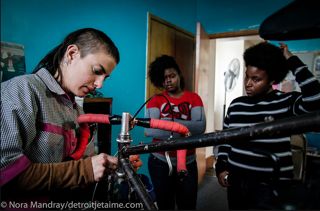A few months ago, I received a nice note from two French filmmakers, who, for some reason, had stumbled across my site and liked it. Their names were Nora Mandray and Hélène Bienvenu, and, as I’d come to learn over the course of subsequent emails, they had been living in the the area for some time, working on a documentary about the resiliency of the people of Detroit. I’d been wanting to interview them for quite a while about their work, but didn’t have an opportunity until just recently. You’ll find our exchange below, but, first, here’s a bit of background.
Nora and Hélène met while undergraduates at the Paris Institute of Political Studies, where they bonded over an interest in Poland. In 2009, the two shot their first “real” documentary together in a small Polish town near the Czech and German borders. Soon afterward, Nora left for the United States, to study filmmaking at UCLA, as a Fulbright scholar. Meanwhile, Hélène worked as a journalist, covering Central Europe. (She eventually settled down in Hungary, working as a foreign correspondent for the daily French newspaper La Croix.) While apart, however, the two continued to collaborate, planning their next film, which they thought would be a documentary on “urban utopias.” They sought money to get the project off the ground, and gained some traction with a grant from the City of Paris in 2009. Then, later that year, thanks to an Arthur K. Peters Memorial Travel Grant, Nora visited Detroit for the first time. It was there that the vision crystalized, and, in 2011, the two received a grant from the French Film Institute (Centre National de la Cinématographie) to create a documentary on the community-driven rebirth of Detroit. And, they’ve been working on it for the past year. The project goes by they name, Detroit je t’aime, and you can find out more at Kickstarter.
 MARK: Would I be correct in assuming that you feel as though Detroit may serve, in some way, as a model for the rest of the world, as resources everywhere begin to constrict, communities re-localize, and government services become less dependable?
MARK: Would I be correct in assuming that you feel as though Detroit may serve, in some way, as a model for the rest of the world, as resources everywhere begin to constrict, communities re-localize, and government services become less dependable?
NORA: Detroit gives a clue as to where the Western civilization is going. Post-industrial societies are still looking for a model to follow. We believe that what some Detroiters have built in terms of self-reliant communities and DIY culture is an example for anybody else, anywhere else in the world. We’re thinking of urban farming, community-oriented bike shops, makerspaces, time banks, the crowdfunding “soups,” etc.
MARK: So, Detroit, in your eyes is a model for grass roots-driven, community-based, radical sustainability?
HELENE: We know a young French family who considered moving to Detroit with their kids after reading our blog… We’re aware that Detroit at large is facing many challenges, and everybody in the city isn’t necessarily trying to be “the change they want to see in the world.” But the efforts that are actually put into saving the city have constantly blown our minds. A place like Recycle Here, for example, offers many opportunities to practice a green lifestyle (while having lots of fun) — it’s a totally unique place where people from all walks of life come together. We’d love to see more places like that in other cities!
MARK: You are, of course, not the only foreign filmmakers who have taken an interest in Detroit. It seems that folks from all over the world are interested in coming to Michigan and capturing on film the parable of Detroit. Those of us in the area often refer to such work as “ruin porn,” which is a phrase I’m sure you’re familiar with.
NORA: Yes, we even wrote a blog post about it.
MARK: For those folks in the audience who aren’t likely to follow the link to your post, can you summarize your thoughts on the genre.
HELENE: For us, ruin porn is to the 21st century what Romantism was to the 19th century. If you look at Caspar David Friedrich’s painting, there’s an uncanny resemblance to “ruin porn” photography. The fact is, you can’t ignore the ruins in Detroit. Most of them are just really beautiful old buildings. They’re part of the landscape. For sure, the tourist who shows up at the Packard Plant with a camera on a Saturday morning will make ruin porn pics, that might look great on Flickr. The actual artist, who wants to capture a sign of our times, will come with the proper lens and will snap a shot at the right time of day. That’s what Romain Meffre and Yves Marchand did. We think that, in their own way, they paid tribute to Detroit’s history. When you look at their pictures, you can’t help but marvel about the past, and question today’s world.
NORA: We personally don’t want to focus on the ruins in Detroit because we want to tell another story about the city. As filmmakers, we use parables all the time to tell universal stories, be it in Detroit or anywhere else in the world. Detroit’s metaphor is what you want it to be. Some see the Motor City as a metaphor for hope, others as a metaphor for the failure of capitalism… For us it’s a metaphor for human ingenuity.
MARK: Would you agree that many in your profession are just interested in documenting the decline of America, as illustrated so clearly in Detroit, and not the heroic efforts being undertaken on the part of many to recreate the City? Do these discussions take place between filmmakers?
NORA: We can’t speak for other filmmakers. Ken Burns says that a great story is “1+1=3” because we just live in an irrational world. It happens that Detroit’s landscape is very irrational: you gotta admit that the decline of Detroit in itself is a “great story.” It requires little effort to come up with a narrative telling the Motor City’s rise and fall. However, finding a hero, meaning the right protagonist for your story, whom you’ll have to follow for a couple of months, if not a full year, is a different kind of commitment. But, at the end of the day, we believe that you have to judge the film, not the person who made it.
MARK: Your objective, as I understand it, when you first came to Detroit, was to create a film about “urban utopias,” with Detroit being one stop among many. Since then, however, it would appear as though your focus has narrowed a bit, with the entire film being about Detroit. Is that correct, and, if so, why? What did you find in Detroit that made you think that an entire documentary was called for?
HELENE: Urban utopias are a huge theme, and just sound very expensive when you work in a low-budget situation like we do. We needed a “point of view” to tell a universal story. During our research, we found that urban farming was often cited as the utopia of the 21st century — and Detroit has been at the “avant-garde” of that movement for many years now. Then, coming to Detroit, we realized that urban farming was part of a larger movement: the DIY, or rather the “DIO” (Do It Ourselves!). When we talk about urban utopia, we don’t think of something impossible, instead we mean the idea of a new society, built on new grounds in hopes of achieving harmony. We do still see this happening in Detroit. It’s definitely in the background of the stories we’ve chosen to tell. The bike shop Fender Bender, operated by women and LGBT people, for example, is one of the focuses of our film. They bring strong and rather revolutionary ideas to the “Motor City.”
 MARK: Would I be correct to assume that there will be an English language version of your film, once it’s completed, as well as a French language version? And, if there are two versions, I’m curious as to whether the only difference between the two will be the language of narration. In other words, I’m curious to know if you think that American and French audiences want something different in a documentary about Detroit, and, if so, whether the film will have to be structurally different for those distinct audiences.
MARK: Would I be correct to assume that there will be an English language version of your film, once it’s completed, as well as a French language version? And, if there are two versions, I’m curious as to whether the only difference between the two will be the language of narration. In other words, I’m curious to know if you think that American and French audiences want something different in a documentary about Detroit, and, if so, whether the film will have to be structurally different for those distinct audiences.
HELENE: Our blog itself has been 100% bilingual from the start. Today, half of our “fans” on Facebook are American, and half are French. Detroit definitely fascinates overseas! There’ll be French subtitles available, and maybe even other languages too, depending on the success of our project. The story will be the same for each side. We’ve met with Americans who knew less about Detroit than some French people who are passionate about the D! Again, what we’re trying to do here is to tell a universal story that can speak to anybody in the world who’s interested in DIY culture as well as urban renewal and sustainability.
MARK: How much time have you spent in Detroit? How much film have you shot in that time? And how many people have you spoken with?
NORA: Helene stayed for the first three months to assist with the research. I stayed on, from last August, and will be in Detroit until October 1st. And I’ve been filming since the beginning. The bulk of the production has been happening since this Spring, and will last until the end of September. Since the research period, we’ve spoken with a countless number of people… over 300, at least — but we don’t interview everybody! The dialogue keeps on going today through our blog.
MARK: Back to urban utopias… Now that you’ve been here for a while, do you think that Detroit qualifies as one? Has your opinion changed at all over time?
NORA: It definitely has elements of it… “pockets” of utopia. We like to say it’s a desert, and, if you look for them, you’ll find great oases.
MARK: You’ve just launched a Kickstarter campaign. How much are you looking to raise, and what will the money be used for?
HELENE: We had been financing our film ourselves for the past few months, but, in order to finish it in a professional fashion, we’re looking to raise $25,000 by July 30th. The money will help complete the film production (we need to hire a DP and a sound mixer for specific scenes), and will especially cover the post-production (we’ll have an editor come on board, and we’ll also hire a crew to build our interactive website). As of today, we’ve secured 26% of our goal through Kickstarter, which means that we still have a long way to go!
MARK: As I’m sure you are aware, there is, for some inexplicable reason, a bizarre anti-French sentiment shared by many on America’s far right…
NORA: (Laughs) Old story! We have a maybe stronger anti-American sentiment in France!
 MARK: I’m curious as to what you make of it, and whether or not you’ve encountered any of it first-hand while in Michigan.
MARK: I’m curious as to what you make of it, and whether or not you’ve encountered any of it first-hand while in Michigan.
NORA: Well, I’m not sure what their argument is… Are we arrogant, or trying to rule the world? We never had to face such a reaction in Michigan. On the contrary. We’ve always been treated very well and respectfully. We love when Detroit activists question French policies! We also discovered there are a couple of Frenchies in Detroit and around. See what PRI has released recently. And Detroit was a French city after all… Not everybody knows about it, but those who do, did ask us how to pronounce the original street names, like Beaubien, Lafayette, etc.
MARK: Can you give us a few examples of Detroit’s so-called “collaborative economy” that you will be highlighting in the film?
NORA: Fender Bender is a huge one as they’re working to start a bike lending library – the first of its kind in Detroit. We’re also focusing on an urban farmer and a hacker, who’s building a free wi-fi network in his neighborhood.
MARK: I’ve heard you both describe this film as “interactive.” In fact, if I’m not mistaken, I believe I’ve read that the film will somehow incorporate a “DIY Toolbox,” which will assist viewers in launching their own projects in this newly evolving collaborative economy of ours. I like the idea, but I’m having a hard time envisioning what that might look like. What exactly do you have in mind?
HELENE It means that our audience will be able to make its own story. Interactive films mix traditional storytelling with video games and social networks. At anytime, a “DIY toolbox” will be available in the corner of the screen. The “DIY Toolbox” will adapt itself to the story: guidelines and tools will suggest you to start similar projects depending on the story that will be unraveling on the screen (be it a community garden, basic bike repairs, or an LED light project.)
MARK: In poking around the internet, I found the following quote from you, Nora. “At a time of economic crisis, there’s no other place to look than Detroit. Detroiters have this urge to build the society of tomorrow – based on social, racial, food, environmental and digital justice.” I’m not trying to be confrontational, but is there really no place but Detroit to look? Are there not lessons to be learned elsewhere?
NORA: There are, of course, many other examples to explore and follow! We chose to focus on Detroit for all the reasons we’ve already outlined. We’ve both lived in and traveled to several different cities around the world, but there’s nothing like Detroit. The city also works as a great place to tell stories largely because of the car industry and the music history: the D already exists in people’s imagination around the world. Now, Detroit is less known for its grassroots initiatives. This is what we want to show… We want Detroit je t’aime to be a platform where people will exchange ideas and tips on the theme of DIY, urban renewal and sustainability.
MARK: While I agree with you that Detroit is, in a sense… like it or not… the world’s incubator, and feel as though there’s much to be learned from what’s happening there now, I think it’s probably worth noting that there are still significant barriers still in place. To name just a few, we have huge problems in the areas of education, poverty, crime, corruption and murder. And, I’m afraid that many of the people who are doing great work in Detroit may, as a result of this, eventually burn out and leave. I’m curious as to whether you saw any signs of this as you traveled through the city, talking with people. How precarious, in your opinion, is this movement, if at all?
NORA: In the past few months, I’ve had a handgun pointed at my dog, my house was almost broken into, and I saw a guy running after another guy who had apparently just stolen his bike. I’ve heard gun shots in different areas of the city. I’ve heard and read many “horror stories.” I’m more than aware that there are still a lot of significant barriers here. If you look around you can see that the city is shrinking down no matter what. It was interesting to follow the debate around the emergency manager taking over the city… We met a lot of young Detroiters who just want to leave and explore other places, but we’ve also met a lot of Detroiters who “came back” or who wanted to “give back” to their city. Last November, a “truth and reconciliation committee” was elected to work on the issues of racism in the city… A lot of work is being done, and of course it will take time. The movement that’s happening now in terms of rebuilding the city might be temporary, but no matter what, we think it’s impacting change, at a micro-level, and it’s inspiring to each and every Detroiter. What we’re really wary of is to see grassroots initiatives being turned into larger, corporate models — it’s on the verge of happening with urban farming. That would be the end of it, probably.
 MARK: What do you want the people of France, in particular, to know about Detroit?
MARK: What do you want the people of France, in particular, to know about Detroit?
HELENE: We want to inspire our French audience to start DIY (and green) projects similar to what’s happening in Detroit. We believe this is what creates community, bonds people together and moves society forward. Such initiatives exist in France, but they’re not necessarily connected with a reflection on the city like it is in Detroit. Here people question their role in the community and how they can effectively impact change in their city. This is a unique approach that doesn’t exist at the same level in Europe.
MARK: Are you aware of any other recent initiatives by the French in Detroit? I believe I heard some time ago, from friends in Hamtramck, that a European art school had purchased a few homes in the city, which the intention of turning them into design laboratories. I believe, in that instance, it was a university in Denmark, but I’m wondering if there might be French initiatives afoot.
HELENE: No, sorry, we’ve been in Hamtramck a couple of times, but we don’t know about that. By “the French” do you mean French people or French institutions? As said previously we do know Frenchies living in the D. We know musicians, photographers… mostly an artist crowd. But also some scientists who work at Wayne State University! All of them definitely have the same opinion on the city as we do.
MARK: While you’ve been in Detroit, you’ve also been writing about the City for French magazines such as Glamour Magazine, Usbek & Rica and Les Inrockuptibles. I’m curious as to what you wrote about, and how those article were received.
HELENE: For Usbek & Rica and Les Inrockuptibles it was very similar to the spirit of our documentary: we talked about Detroit as a laboratory of DIY culture. We interviewed Grace Lee Boggs for that article specifically, among others. For Les Inrocks we covered the fascinating issue of digital justice in view of the Allied Media conference that recently took place. In both places, we provided visual and written portraits of relevant Detroit makers. For Glamour, we wrote about the “generation Y”, the young doers who move to Detroit from other American cities in order to get involved in a community at a deeper level. After each article got published, we received dozens of email and comments of people who had read them and wanted to get in touch to learn more, and even, visit (or move!) to Detroit.
And, here is their Kickstarter video. If, after watching it, you’d like to make a contribution, just click here.

 MARK: Would I be correct in assuming that you feel as though Detroit may serve, in some way, as a model for the rest of the world, as resources everywhere begin to constrict, communities re-localize, and government services become less dependable?
MARK: Would I be correct in assuming that you feel as though Detroit may serve, in some way, as a model for the rest of the world, as resources everywhere begin to constrict, communities re-localize, and government services become less dependable?  MARK: Would I be correct to assume that there will be an English language version of your film, once it’s completed, as well as a French language version? And, if there are two versions, I’m curious as to whether the only difference between the two will be the language of narration. In other words, I’m curious to know if you think that American and French audiences want something different in a documentary about Detroit, and, if so, whether the film will have to be structurally different for those distinct audiences.
MARK: Would I be correct to assume that there will be an English language version of your film, once it’s completed, as well as a French language version? And, if there are two versions, I’m curious as to whether the only difference between the two will be the language of narration. In other words, I’m curious to know if you think that American and French audiences want something different in a documentary about Detroit, and, if so, whether the film will have to be structurally different for those distinct audiences. MARK: I’m curious as to what you make of it, and whether or not you’ve encountered any of it first-hand while in Michigan.
MARK: I’m curious as to what you make of it, and whether or not you’ve encountered any of it first-hand while in Michigan. MARK: What do you want the people of France, in particular, to know about Detroit?
MARK: What do you want the people of France, in particular, to know about Detroit? According to reports emanating from the swirling gyre of paranoia and retardation that is the Willow Run Tea Party Caucus, it looks as though everyone’s favorite demagoguing mama grizzly, Sarah Palin, will be with us this weekend, promoting the overthrow of our democratically elected officials and extolling the virtues of corporate fascism. According to organizers of the event at which she will be speaking, Palin “literally bent over backwards to clear her schedule” when she heard that the few thousand dollars raised from the event would benefit wounded soldiers. (Apparently, her considerable speaking fee, which is being paid by
According to reports emanating from the swirling gyre of paranoia and retardation that is the Willow Run Tea Party Caucus, it looks as though everyone’s favorite demagoguing mama grizzly, Sarah Palin, will be with us this weekend, promoting the overthrow of our democratically elected officials and extolling the virtues of corporate fascism. According to organizers of the event at which she will be speaking, Palin “literally bent over backwards to clear her schedule” when she heard that the few thousand dollars raised from the event would benefit wounded soldiers. (Apparently, her considerable speaking fee, which is being paid by 









